Related Research Articles
Gangsta rap or gangster rap, initially called reality rap, is a subgenre of hip-hop that conveys the culture and values typical of urban gangs and street hustlers. Emerging in the late 1980s, gangsta rap's pioneers include Schoolly D of Philadelphia and Ice-T of Los Angeles, later expanding in California with artists such as N.W.A and Tupac Shakur. In 1992, via record producer and rapper Dr. Dre, rapper Snoop Dogg, and their G-funk sound, gangster rap broadened to mainstream popularity.
Indian hip hop is a genre of popular music developed in India. Desi hip hop is a term given by Bohemia for music and culture which combines the influences of hip hop and the Indian subcontinent; the term desi referring to the South Asian diaspora. The term has also come to be used as an alternative for rap music and even pop music which involves rappers of South Asian origins.
Asian underground is a term associated with various British Asian and South Asian Canadian musicians who blend elements of Western underground dance music and the traditional Asian music of their home countries in South Asia. The sound has roots in the South Asian Diaspora, and many notable musicians within the genre are immigrants or children of immigrants. The first well-known mention was the compilation album Anokha - Soundz of the Asian Underground released in 1997 and masterminded by Talvin Singh and Sweety Kapoor. It is not a strict musical genre per se, since the specific sounds can vary wildly.

Political hip hop is a subgenre of hip hop music that was developed in the 1980s as a way of turning hip hop into a form of political activism. Political hip hop generally uses the medium of hip hop music to comment on sociopolitical issues and send political messages to inspire action, create social change, or to convince the listener of a particular worldview. It was inspired partially by politically-focused 1970s artists such as The Last Poets and Gil Scott-Heron, as well as the Black Power movement and revolutionary politics of the 1960s and 1970s. Various hip hop artists emerged in the late 1980s espousing political messages and providing social and political commentary with KRS-One and his group Boogie Down Productions and Public Enemy in particular establishing themselves as some of the first predominantly political hip hop groups with albums in 1988. Soon to follow in 1989 and following years were other Political rappers, or known as "Conscious rap" including such groups as X-Clan, Poor Righteous Teachers, Paris (rapper), Disposable Heroes of Hiphoprisy and others The genre has helped to create a new form of social expression for subordinate groups to speak about their exclusions, injustices, and lack of power.
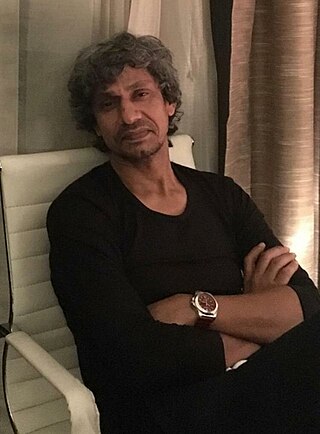
Vijay Raaz is an Indian actor, film director and narrator, who predominantly appears in Hindi films. He debuted with Bhopal Express (1999) and since worked in more than 90 films. His breakthrough came when he played the role of Dubeyji in the movie Monsoon Wedding in 2001. Raaz garnered recognition for his comedic role in Run (2004) and Dhamaal (2007). He is noted for playing gangster roles in Delhi Belly (2011) and Dedh Ishqiya (2014) as well as other notable films include Stree (2018), Zoya Akhtar's Gully Boy (2019), Lootcase (2020), Sanjay Leela Bhansali's Gangubai Kathiawadi (2022). In 2014, he debuted as a director with Kya Dilli Kya Lahore. His gruff baritone voice has been used in voice-over work, including films and commercials.
Hip-hop or hip hop music, also known as rap, and formerly as disco rap, is a genre of popular music that originated in the early 1970s by African Americans and Caribbean immigrants in the Bronx, a borough of New York City. Hip-hop music originated as an anti-drug and anti-violence genre consisting of stylized rhythmic music that often accompanies rapping, a rhythmic delivery of poetic speech. In the early 1990s, a professor of African American studies at Temple University said, "hip hop is something that blacks can unequivocally claim as their own." By the 21st century, the field of rappers had diversified by both race and gender. The music developed as part of the broader hip hop culture, a subculture defined by four key stylistic elements: MCing/rapping, DJing/scratching with turntables, breakdancing, and graffiti art. While often used to refer solely to rapping and rap music, "hip hop" more properly denotes the practice of the entire subculture. The term hip hop music is sometimes used synonymously with the term rap music, though rapping is not a required component of hip hop music; the genre may also incorporate other elements of the culture, including DJing, turntablism, scratching, beatboxing, and instrumental tracks.
Alternative hip hop is a subgenre of hip hop music that encompasses a wide range of styles that are not typically identified as mainstream. AllMusic defines it as comprising "hip hop groups that refuse to conform to any of the traditional stereotypes of rap, such as gangsta, bass, hardcore, and party rap. Instead, they blur genres drawing equally from funk and pop/rock, as well as jazz, soul, reggae, and even folk."

Ranveer Singh Bhavnani is an Indian actor who works in Hindi films. He is the recipient of several awards, including five Filmfare Awards. He is among the highest-paid Indian actors and has been featured in Forbes India's Celebrity 100 list since 2012.
Desi hip hop is a term for music and culture which combines the influences of hip hop and the Indian subcontinent; the term desi referring to the South Asian diaspora. The term has also come to be used as an alternative for rap music and even pop music which involves rappers of South Asian origins.
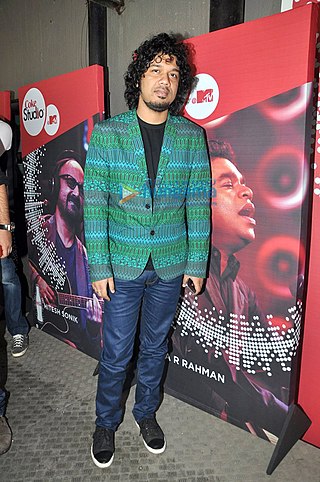
Angaraag Mahanta, known by his stagename Papon, is an Indian playback singer and composer from Assam. Papon has also sung in many languages apart from Assamese like Hindi, Bengali, Tamil and Marathi. He is the lead vocalist and founder of the folk-fusion band Papon and The East India Company. He is the son of the noted Assamese singer Khagen Mahanta and Archana Mahanta.

Aditya Prateek Singh Sisodia, professionally known as Badshah, is an Indian rapper, singer, songwriter, and producer. Badshah's music style is diverse encompassing Indian pop, hip-hop, rap, synthwave, underground rap, pop rap and hardcore rap music. He has his songs in Hindi, English, Punjabi and Harayanvi languages. He is currently signed with Universal Music Group. He has contributed to several Bollywood movies including Humpty Sharma Ki Dulhania, Veere Di Wedding, Bala, Namaste England, Kapoor and Sons, Crew,Crew Good Newz and Khoobsurat.
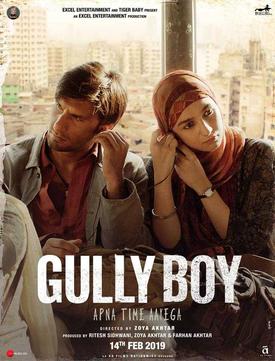
Gully Boy is a 2019 Indian Hindi-language musical drama film directed by Zoya Akhtar, and written by Akhtar and Reema Kagti. The film was produced by Ritesh Sidhwani, Akhtar and Farhan Akhtar under the banners of Tiger Baby Films and Excel Entertainment productions, with American rapper Nas as an executive producer. It stars Ranveer Singh in the title role alongside Alia Bhatt, Kalki Koechlin, Siddhant Chaturvedi, Vijay Varma, Amruta Subhash and Vijay Raaz in supporting roles. Inspired by the lives of Indian street rappers DIVINE and Naezy, the film is a coming-of-age story about aspiring street rapper Murad Ahmed (Singh), from the Dharavi slums of Mumbai.

Vighnesh Shivanand, better known by his stage name Brodha V, is an Indian hip-hop artist, lyricist, rapper and music producer. Born in Kanchipuram, the Tamil Nadu-based artist started rapping at the age of 18 and took part in online rap battles on Orkut. As an independent artist, Brodha V released a mixtape called Deathpunch which had a limited release and which garnered him some attention from the hip hop fraternity and the independent music circuit in South India.
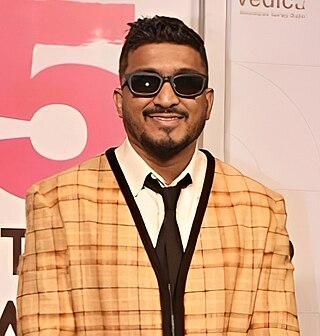
Vivian Wilson da Silva Fernandes, known professionally as Divine, is an Indian rapper of Goan descent. Born and raised in Andheri, Mumbai, Divine started gaining popularity after the release of his single "Yeh Mera Bombay" in 2013. He broke through with the release of "Mere Gully Mein" in 2019, which featured fellow Mumbai-based rapper Naezy.

Street Academics is an Indian alternative hip-hop group from Kerala, known for their songs blending Malayalam, English and Tamil lyrics. The collective of rappers based out of various districts from their home state are noted for emphasizing on contemporary and philosophical themes ranging from social realism to dystopian fantasy. They collaborate with projects like Mappila Lahala and Palakkadan Dystopia, to release songs that focus on having cultural discussions set in avant-garde backdrops.
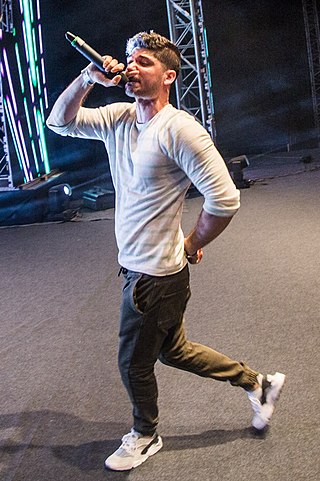
Krishna Kaul, known mononymously as Krishna is an Indian rapper. He was one of the earliest rappers to emerge in the Indian hip hop scene in the mid-2000s under the stage name Prozpekt. He was briefly featured in the 2019 Bollywood film Gully Boy as himself. He is widely acknowledged within the Desi Hip Hop community for pioneering a lyrical revolution in the genre, infusing a new wave of poetic depth and lyrical complexity into hip hop's narrative.

Naved Shaikh, better known by his stage name Naezy, is an Indian rapper from Mumbai, Maharashtra, who first broke into mainstream rap with the song "Mere Gully Mein" featuring fellow rapper DIVINE. A fictional version of his character has been portrayed by Ranveer Singh in the Zoya Akhtar-directed 2019 musical film Gully Boy. He made his film debut with the hit song "Birju" from the 2015 film Hey Bro, the music video for which featured celebrated Bollywood actors Amitabh Bachchan, Akshay Kumar, Hrithik Roshan, Ajay Devgn, as well as choreographer Prabhu Deva, with the film's lead actor Ganesh Acharya.

The 12th Smule Mirchi Music Awards or simply Mirchi Music Awards 2020, was the 12th edition of the Mirchi Music Awards and took place on 19 February 2020. The award ceremony was hosted by Aparshakti Khurana, Neeti Mohan, and Shekhar Ravjiani at Yash Raj Studios, Mumbai. The title sponsor was Smule, replacing Pepsi.

Gully Boy is the soundtrack album for the 2019 film of the same name directed by Zoya Akhtar. The soundtrack includes work by DIVINE, Naezy, Sez on the Beat, Rishi Rich, Dub Sharma, Jasleen Royal, Ace, Ishq Bector, MC Altaf, MC TodFod, 100RBH, Maharya, Noxious D, Viveick Rajagopalan, and others.

Nathan Joseph Mendes known professionally as Tsumyoki, is an Indian rapper, singer-songwriter, and record producer. He gained popularity from his single track release, "White Tee" (2019), Daboij album (2021), maiden EP release, Way Too Messy (2021), featuring fellow Goan rapper, Kidd Mange and "Pink Blue" (2022), featuring Bharg. His stage name defines "vision, productivity and a positive mindset".
References
- 1 2 3 4 5 Sarrazin, N. (2019). Focus: Popular Music in Contemporary India. Focus on World Music Series. Taylor & Francis. p. 188. ISBN 978-0-429-99931-4 . Retrieved 2022-09-12.
- 1 2 3 4 5 6 7 "The Rise of Street Rap in India". VICE. 2019-01-17. Retrieved 2022-09-12.
- 1 2 3 4 5 6 Ellis-Petersen, Hannah (2016-05-16). "Poverty, corruption and crime: how India's 'gully rap' tells story of real life". the Guardian. Retrieved 2022-09-12.
- 1 2 3 4 5 6 7 Pool, Ali Bharmal/Red Bull Content (2019-07-25). "Why gully rap is liberating India's youth". Red Bull. Retrieved 2022-09-12.
- ↑ Daga, Bhagyalakshmi (2022). "Straight Outta Mumbai: Exploring Informality and Innovation in Dharavi's Hip-Hop Industry". Music Business Research. Cham: Springer International Publishing. pp. 131–149. doi:10.1007/978-3-031-09532-0_8. ISBN 978-3-031-09531-3. ISSN 2522-0829.
- ↑ Morrow, G.; Nordgård, D.; Tschmuck, P. (2022). Rethinking the Music Business: Music Contexts, Rights, Data, and COVID-19. Music Business Research. Springer International Publishing. p. 146. ISBN 978-3-031-09532-0 . Retrieved 2022-09-12.
- ↑ Indulge, Team (2018-06-20). "Documentary on Gully Rap titled Kya Bolta Bantai released online". The New Indian Express. Retrieved 2022-09-12.